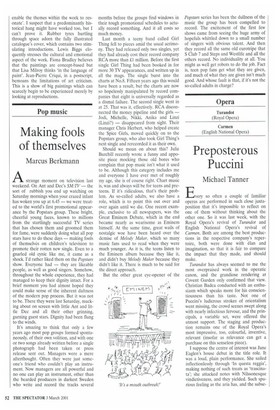Pop music
Making fools of themselves
Marcus Berkrnann
Astrange moment on television last weekend. On Ant and Dec's SM:TV — the sort of rubbish you end up watching on Saturday mornings when your crazed infant has woken you up at 6.45 — we were treated to the world's first promotional appearance by the Popstars group. These bright, cheerful young faces, known to millions from the startlingly successful TV series that has chosen them and groomed them for fame, were suddenly doing what all pop stars have to do these days — making fools of themselves on children's television to promote their rotten new single. Even to a gnarled old cynic like me, it came as a shock. I'd rather liked them on the Popstars show. Everyone had — they are likeable people, as well as good singers. Somehow, throughout the whole experience, they had managed to keep their dignity intact. For a brief moment you had almost hoped they could make sense of the inherent daftness of the modern pop process. But it was not to be. There they were last Saturday, mucking about on screen with little Ant and little Dec and all their other grinning, gurning guest stars. Dignity had been flung to the winds.
It's amazing to think that only a few years ago most pop groups formed spontaneously, of their own volition, and with one or two songs already written before a single photograph had been taken or press release sent out. Managers were a mere afterthought. Often they were just someone's friend who couldn't play an instrument. Now managers are all powerful and no one can play an instrument, other than the bearded producers in darkest Sweden who write and record the tracks several months before the groups find windows in their tough promotional schedules to actually record something. And it all costs so much money.
Last month a teeny band called Girl Thing fell to pieces amid the usual acrimony. They had released only two singles, yet they had already cost their record company RCA more than £1 million. Before the first single Girl Thing had been booked in for more 30 TV appearances, and written up in all the mags. The single burst into the charts at No.8. Fifteen years ago this would have been a result, but the charts are now so hopelessly manipulated by record companies that eight is universally regarded as a dismal failure. The second single went in at 25. That was it, effectively. RCA disconnected the money pipeline and the girls — Jodi, Michelle, Nikki, Anika and Linzi (Linzi?) — disappeared from sight. Their manager Chris Herbert, who helped create the Spice Girls, moved quickly on to the Popstars group, who also took Girl Thing's next single and rerecorded it as their own.
Should we moan on about this? Julie Burchill recently wrote a funny and apposite piece mocking those old bores who complain that pop music isn't what it used to be. Although this category includes me and everyone I have ever met of roughly my age, she is of course right. Chart music is, was and always will be for teens and preteens. If it's ridiculous, that's their problem. As so-called adults, we also have a role, which is to point this out over and over again until we die. One recent example, exclusive to all newspapers, was the Great Eminem Debate, which in the end became nearly as wearisome as Eminem himself. At the same time, great wails of nostalgic woe have been heard over the demise of Melody Maker, which so many music fans used to read when they were much younger. As it is, the teens listen to the Eminem album because they like it, and didn't buy Melody Maker because they didn't like it. There is much to be said for the direct approach.
But the other great eye-opener of the Popstars series has been the dullness of the music the group has been compelled to record. The excitement of the first few shows came from seeing the huge army of hopefuls whittled down to a small number of singers with obvious talent. And then they record all the same old eurotripe that S Club 7 and Steps and Westlife and all the others record. No individuality at all. You might as well get robots to do the job. Fact is, teen pop fans get what they are given, and much of what they are given isn't much good. And whose fault is that, if it's not the so-called adults in charge?












































































 Previous page
Previous page